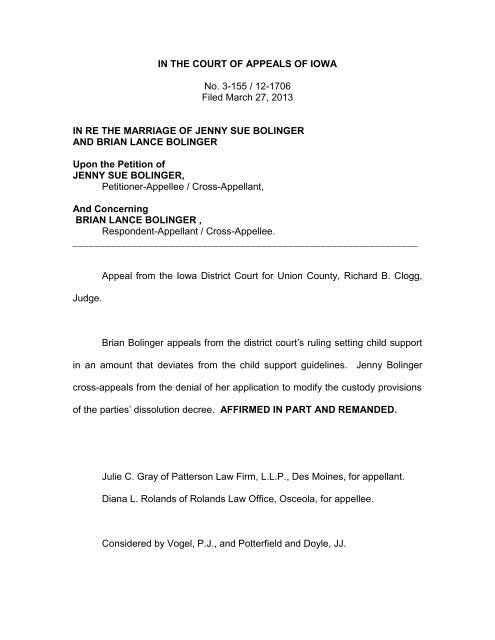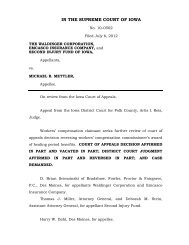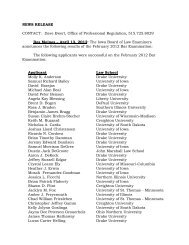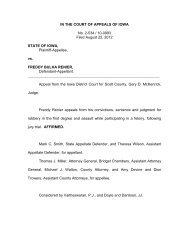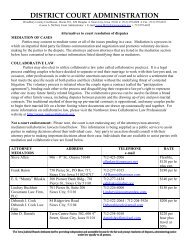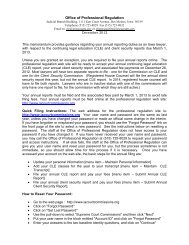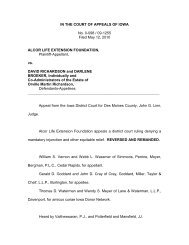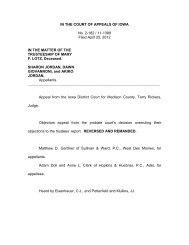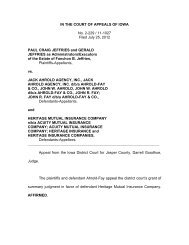IN THE COURT OF APPEALS OF IOWA No. 3-155 / 12-1706 Filed ...
IN THE COURT OF APPEALS OF IOWA No. 3-155 / 12-1706 Filed ...
IN THE COURT OF APPEALS OF IOWA No. 3-155 / 12-1706 Filed ...
You also want an ePaper? Increase the reach of your titles
YUMPU automatically turns print PDFs into web optimized ePapers that Google loves.
<strong>IN</strong> <strong>THE</strong> <strong>COURT</strong> <strong>OF</strong> <strong>APPEALS</strong> <strong>OF</strong> <strong>IOWA</strong><br />
<strong>No</strong>. 3-<strong>155</strong> / <strong>12</strong>-<strong>1706</strong><br />
<strong>Filed</strong> March 27, 2013<br />
<strong>IN</strong> RE <strong>THE</strong> MARRIAGE <strong>OF</strong> JENNY SUE BOL<strong>IN</strong>GER<br />
AND BRIAN LANCE BOL<strong>IN</strong>GER<br />
Upon the Petition of<br />
JENNY SUE BOL<strong>IN</strong>GER,<br />
Petitioner-Appellee / Cross-Appellant,<br />
And Concerning<br />
BRIAN LANCE BOL<strong>IN</strong>GER ,<br />
Respondent-Appellant / Cross-Appellee.<br />
________________________________________________________________<br />
Judge.<br />
Appeal from the Iowa District Court for Union County, Richard B. Clogg,<br />
Brian Bolinger appeals from the district court’s ruling setting child support<br />
in an amount that deviates from the child support guidelines. Jenny Bolinger<br />
cross-appeals from the denial of her application to modify the custody provisions<br />
of the parties’ dissolution decree. AFFIRMED <strong>IN</strong> PART AND REMANDED.<br />
Julie C. Gray of Patterson Law Firm, L.L.P., Des Moines, for appellant.<br />
Diana L. Rolands of Rolands Law Office, Osceola, for appellee.<br />
Considered by Vogel, P.J., and Potterfield and Doyle, JJ.
POTTERFIELD, J.<br />
2<br />
In this action to modify the parties’ dissolution decree, Brian Bolinger<br />
appeals from the district court’s ruling setting child support in an amount that<br />
deviates from the child support guidelines. Jenny Bolinger cross-appeals from<br />
the denial of her application to modify the custody provisions and raises other<br />
issues. The district court did not err in failing to modify the physical care of the<br />
children. However, the court made inconsistent rulings in ordering equal<br />
parenting time, but deviating from the child support guidelines on the ground that<br />
the “parties’ joint physical custody arrangement is not equal and results in the<br />
children residing with Jenny more than with Brian.” We remand for recalculation<br />
of child support.<br />
I. Background Facts and Proceedings.<br />
In October 2005, the district court entered a dissolution decree<br />
incorporating the parties’ stipulations as to child custody and support. The<br />
decree provided that Brian and Jenny “shall each share jointly the legal custody<br />
and physical care” of their two minor children. Brian was ordered to pay $137.50<br />
per week to Jenny for child support.<br />
On October 25, 2011, Jenny filed an application to modify the decree<br />
concerning support, visitation, and secondary education expenses. She alleged<br />
there had been a substantial change of circumstances in that “the parties agreed<br />
upon alteration of the shared physical care schedule which the parties have been<br />
following.” Brian answered, seeking additional time with the children, and in a<br />
counterclaim, asserting that even though the parties’ incomes had increased, the
3<br />
child support originally ordered was higher than called for by application of the<br />
guidelines.<br />
A hearing was held. One witness stated she had “never seen a more civil<br />
divorce than what Brian and Jenny had.” Both parents were involved in their<br />
children’s lives, shared similar parenting styles, communicated well together, and<br />
were flexible in the children’s care. When the parties were first divorced, the<br />
children generally stayed overnight with Jenny and spent every other weekend<br />
with Brian. Brian would stop by to see the children after he got off work to “play<br />
or ride bikes or whatever” quite often. In 2009, their son began to spend<br />
additional evenings during the week with Brian one-on-one, on the advice of a<br />
counselor. Thereafter, the daughter, too, spent one evening each week with her<br />
father, one-on-one. The children have their own rooms at each parent’s home.<br />
Brian drives the children to school three days per week.<br />
Brian described the parenting schedule at the time of the hearing:<br />
Tuesday and Thursday nights, the son was with Brian. Wednesday night the<br />
daughter was with Brian. Every other Friday and Saturday, both children stayed<br />
with him overnight. Brian asked that the children be allowed to spend Sunday<br />
nights with him as well, but Jenny refused saying the children should be at “home<br />
in their own beds.”<br />
The district court stated the “current dispute involves whether the children<br />
should be allowed to spend Sunday overnight with Brian on the weekends they<br />
are at his home. Jenny wants them to come home Sunday evening. Brian wants<br />
them to sleep at his home until Monday morning.” The court refused to modify<br />
the physical care provisions of the decree finding that Jenny had not met her
4<br />
burden to prove a substantial change of circumstances to justify a change in the<br />
joint physical care provision of the decree. The court also ordered, “To the extent<br />
the parties cannot agree to a parenting time schedule, the following schedule will<br />
be implemented”:<br />
Sunday Monday Tuesday Wednesday Thursday Friday Saturday<br />
Week 1 J J B/J B/J B B B<br />
Week 2 B J B/J B/J B J J<br />
The court explained:<br />
In accordance with the above schedule, Petitioner shall exercise<br />
parenting time with both children every Monday and every other<br />
Friday, Saturday, and Sunday. Respondent shall exercise<br />
parenting time with both children every Thursday and every other<br />
Friday, Saturday, and Sunday. Each Tuesday, Petitioner shall<br />
exercise parenting time with [the daughter] while Respondent<br />
exercise parenting times with [the son], and each Wednesday<br />
Petitioner shall exercise parenting time with [the son] while<br />
Respondent exercises parenting time with [the daughter], in order<br />
to allow individual time for each child with Petitioner and<br />
Respondent. [1]<br />
Citing Iowa Code section 598.21C(2)(a) (2011), the court did modify the<br />
support provisions. The court found that pursuant to the child support guidelines,<br />
under a joint physical care scenario and using the offset approach, Brian would<br />
pay Jenny $355.40 per month for two children. The court deviated from that<br />
amount, however, stating:<br />
4. Based on the parties’ income and equally shared physical<br />
custody, the Child Support Guidelines call for Brian to pay Jenny<br />
$355.40 for two children and $249.89 for one child.<br />
5. If child support is figured under the Guidelines with Jenny<br />
as the custodial parent and Brian being given credit for the actual<br />
days the parties split physical custody, the child support would be<br />
$875.48 for two children and $615.57 for one child.<br />
1 We assume the court’s order of “parenting time” means overnight stays. If this<br />
assumption is incorrect, the district court has the opportunity to clarify on remand.
5<br />
6. The court finds and concludes that the support order<br />
herein shall vary from the amount of child support which would<br />
result from application of the guidelines. In this case applying the<br />
guidelines would be unjust and inappropriate as determined under<br />
the criteria prescribed by Iowa Code section 598.21B. The parties’<br />
joint physical custody arrangement is not equal and results in the<br />
children residing with Jenny more than with Brian. Variation from<br />
the guidelines is required because substantial injustice would result<br />
from the guidelines. In addition, adjustment is necessary to provide<br />
for the needs of the children and do justice between the parties in<br />
light of the parties’ joint physical custody arrangement.<br />
(Emphasis in original).<br />
II. Scope and Standard of Review.<br />
Our review in equity cases is de novo. Iowa R. App. P. 6.907. We give<br />
weight to the trial court’s findings, especially when considering the credibility of<br />
witnesses, but are not bound by them. Iowa R. App. P. 6.904(3)(g).<br />
III. Discussion.<br />
A. Brian’s appeal. On appeal, Brian contends the district court<br />
erred in deviating from the child support guidelines. Based on the record before<br />
us, we would agree. Here, the dissolution decree awarded the parties joint<br />
physical care.<br />
Therefore, both parents have an equal responsibility to maintain<br />
homes and provide routine care, with neither party having superior<br />
rights or responsibilities with respect to the children. See Iowa<br />
Code § 598.1(4). In Iowa, we use the offset method for calculating<br />
child support in cases involving joint physical care. In re Seay, 746<br />
N.W.2d 833, 835 (Iowa 2008) (citing Iowa Ct. R. 9.14). “The rule<br />
reflects the difference between joint physical care and other<br />
parental arrangements.” Id. The offset approach requires the court<br />
to calculate the amount each party would be required to pay if they<br />
were a noncustodial parent and then base the child support upon<br />
the difference between those two amounts. Id. at 834.<br />
In re Marriage of McDermott, ___ N.W.2d ___, ___, 2013 WL 765316, at *10<br />
(Iowa 2013).
6<br />
In McDermott, the court reiterated that a court “may not deviate from the<br />
amount of the child support yielded by the guidelines ‘without a written finding<br />
that the guidelines would be unjust or inappropriate under specific criteria.’” Id.<br />
(quoting In re Marriage of Powell, 474 N.W.2d 531, 533 (Iowa 1991)).<br />
The district court made a finding that the guidelines support would be<br />
unjust because “[t]he parties’ joint physical custody arrangement is not equal and<br />
results in the children residing with Jenny more than with Brian.” This finding is<br />
then contradicted by the court’s order of equal parenting time.<br />
B. Jenny’s cross-appeal. However, on cross-appeal, Jenny argues<br />
the court erred in failing to modify the physical care provisions of the decree “to<br />
reflect the actual custodial arrangement.” The custodial arrangement as ordered<br />
was joint physical care. Each parent shares parenting time, maintains a home,<br />
and provides routine daily care for the children. See Iowa Code § 598.1(4); In re<br />
Marriage of Brown, 778 N.W.2d 47, 51 (Iowa Ct. App. 2009). Joint physical care<br />
“does not require that the residential arrangements be determined with<br />
mathematical precision.” 2 Seay, 746 N.W.2d at 836; see In re Marriage of<br />
Hynick, 727 N.W.2d 575, 579 (Iowa 2007) (“Joint physical care anticipates that<br />
parents will have equal, or roughly equal, residential time with the child.”<br />
(emphasis added)).<br />
Courts are empowered to modify the custodial terms of a dissolution only<br />
when there has been a substantial change in circumstances since the time of the<br />
decree not contemplated by the court when the decree was entered, which is<br />
2 Both parties testified that, in practice, their residential time with the children was not<br />
equal.
7<br />
more or less permanent and relates to the welfare of the child. See Brown, 778<br />
N.W.2d at 51. “The heavy burden upon a party seeking to modify custody stems<br />
from the principle that once custody has been fixed it should be disturbed for only<br />
the most cogent reasons.” Id. at 52.<br />
Upon our de novo review, we agree with the district court that Jenny has<br />
failed to meet her heavy burden to establish the existence of a substantial<br />
change of circumstances to warrant a change in the physical care. 3 We<br />
therefore affirm the district court’s denial of the application to modify the physical<br />
care provisions of the decree.<br />
However, “[t]he burden to change a visitation provision in a decree is<br />
substantially less than to modify custody.” In re Marriage of Malloy, 687 N.W.2d<br />
110, 113 (Iowa Ct. App. 2004). This court has concluded that when joint physical<br />
care is granted, a change in the parenting schedule is more akin to a change in<br />
visitation than a change in custody and requires a lower standard of proof. See<br />
Brown, 778 N.W.2d at 52. Here, the decree did not contain any particular<br />
parenting or visitation schedule. Upon the parties’ request, the district court<br />
entered a more specific ruling as to parenting time. Under the district court’s<br />
ruling and order, the parties will be equally sharing residential time with the<br />
children. We affirm that modification of the parenting schedule.<br />
C. Child support. Jenny contends the court erred in calculating<br />
child support because it did not include Brian’s farm income. She also argues<br />
3 Jenny contends that Brian admitted a substantial change of circumstances existed to<br />
warrant a change of the custodial provisions of the decree. Brian did admit a change of<br />
circumstances, but contends the change “calls for an enhancement of the time [he]<br />
spends with the children.”
8<br />
the court should have ruled the child support was retroactively modified three<br />
months after the petition was served.<br />
The court deviated from the child support guidelines based upon its finding<br />
that the “parties’ joint physical custody arrangement is not equal and results in<br />
the children residing with Jenny more than with Brian.” As noted above, this<br />
ruling is contradicted by the district court’s ruling which appears to modify the<br />
parenting schedule to equal parenting time. Thus, if the district court’s intention<br />
as to “parenting time” included overnight stays, its finding that a deviation is<br />
justified based on unequal parenting times is in error.<br />
We therefore remand to the district court to recalculate child support,<br />
noting especially the supreme court’s recent statements as to joint physical care,<br />
the child support guidelines, and the parents’ responsibilities with respect to<br />
extracurricular expenses. See McDermott, 2013 WL 765316, at *<strong>12</strong>.<br />
D. Uncovered medical costs. Jenny also complains that the district<br />
court erred in requiring all uncovered medical costs to be split equally between<br />
the parties. While we note that this was the relief Jenny sought at the hearing, in<br />
light of our remand and Iowa Child Support Guidelines rule 9.<strong>12</strong>(5), 4 we leave the<br />
issue to the district court.<br />
E. Trial attorney fees. Jenny argues that the district court erred in<br />
denying her request for attorney fees. An award of trial attorney fees rests in the<br />
sound discretion of the trial court and will not be disturbed on appeal in the<br />
absence of an abuse of discretion. In re Marriage of Romanelli, 570 N.W.2d 761,<br />
4 Rule 9.<strong>12</strong>(5) provides, in part, “Uncovered medical expenses in excess of $250 per<br />
child or a maximum of $800 per year for all children shall be paid by the parents in<br />
proportion to their respective net incomes.”
9<br />
765 (Iowa 1997). We find no abuse of discretion in the district court’s denial of<br />
attorney fees in light of Jenny’s lack of success on the merits.<br />
B. Appellate Attorney Fees. Jenny requests appellate attorney fees. An<br />
award of appellate attorney fees is not a matter of right, but rests within the<br />
court’s discretion. In re Marriage of Kurtt, 561 N.W.2d 385, 389 (Iowa Ct.<br />
App.1997). We consider the needs of the party making the request, the ability of<br />
the other party to pay, and whether the party making the request was obligated to<br />
defend the district court’s decision on appeal. In re Marriage of Maher, 596<br />
N.W.2d 561, 568 (Iowa 1999). We deny Jenny’s request for appellate attorney<br />
fees.<br />
Costs on appeal are taxed one-half to each party.<br />
AFFIRMED <strong>IN</strong> PART AND REMANDED.


